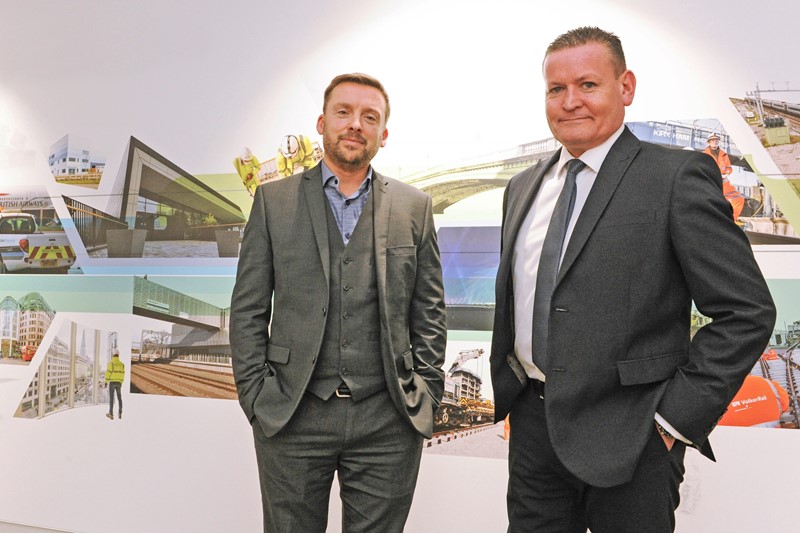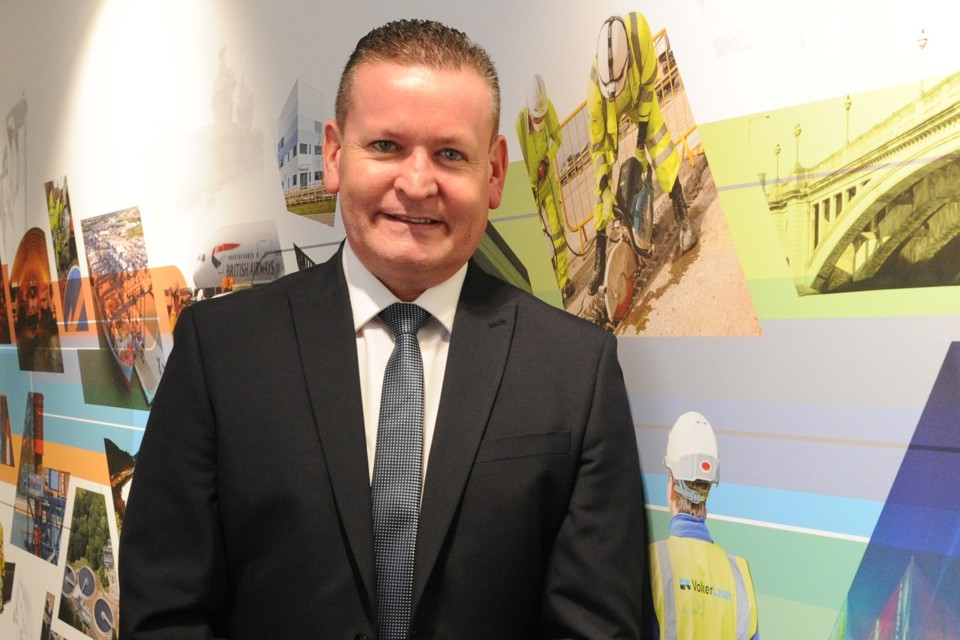Spencer Ward, head of fleet at multi-disciplinary contractor VolkerWessels UK (pictured), welcomes scrutiny. He is responsible for 1,853 vehicles across the group’s five business units (VolkerFitzpatrick, VolkerRail, VolkerStevin, VolkerHighways and VolkerLaser) and when the managing directors of each business unit question fleet safety information in the monthly board reports, he sees it as proof that fleet is taken seriously.
“Our brand is not to be put at risk,” Ward says. “It’s driven from the very top. The information we provide gets challenged, it gets questioned, which is great for me because it means it’s being read. I’m not uneasy about that in any way. I welcome that.
“The five MDs all have their different questions. It could be about penalty charge notices or risk scores from our licence checker, for example. They really home in on those and want to know more detail. They recognise it’s their business and they want to do the right thing.”
Doing the ‘right thing’ could mean further driver training or identifying if there is something affecting an employee’s wellbeing.
“We need to get to the bottom of it because they could be a risk to themselves or a risk to someone else,” Ward says.
VolkerWessels has a comprehensive approach to road risk management which incorporates risk assessments, licence checks, on-the-road training, an annual medical, daily walkaround checks using tablets and smartphones, speed limiters, telematics, campaigns and an internal safety award.
It also spreads its road safety message externally by visiting local schools, where children have the chance to sit in the cab of one its vehicles and appreciate the blind-spots the driver faces, and through sub-contractors it promotes its standards to.
Stuart Webster-Spriggs, HSQE (health, safety, quality and environmental) director at VolkerRail (pictured below with Ward), which has the lion’s share of the VolkerWessels fleet (430 company cars, 326 vans and one HGV), says that in the latter case it works both ways.
“Some of the supply chain have quite large fleets themselves so we’re learning from them as much as they’re learning from us,” he says.
“For instance, one of our sub-contractors did an education piece to the industry about driver fatigue and we’ve taken that on board.”
The five business units within Volker-Wessels also share best practice.
For instance, VolkerRail has adopted the documentation, briefing and training which VolkerHighways has done on safe loading.
“Spencer co-ordinates and shares best practice with everyone else,” Webster-Spriggs says.
Team of 10 at head office
VolkerWessels has a central fleet team of 10 people, based at its head office in Hoddesdon, Hertfordshire, which manages procurement of the entire fleet.
The team is split into two disciplines: cars and commercial vehicles. The latter is made up of a group transport manager and fleet compliance officers who manage and police the six operating licences and accreditations with FORS and Driving for Better Business.
“They’re regularly doing audits to ensure we’re as compliant as we possibly can be,” Ward says.
The car fleet team manages everything from procuring company cars through Volker-Wessels’ leasing company Lex Autolease to the compliance of the grey fleet.
An additional team member at the Doncaster office works specifically for VolkerRail, helping to manage the deployment of the fleet and policies, procedures and compliance, and reports into Ward.
“VolkerRail is quite vehicle-intensive on its projects so we felt we needed to have a person in situ within that office,” Ward says.
 It is VolkerRail which has so far received recognition for its work on road safety, picking up the Brake company driver safety (medium fleet) award last year in addition to receiving its eighth consecutive RoSPA (Royal Society for the Prevention of Accidents) award for fleet safety, thanks to Webster-Spriggs putting the business forward.
It is VolkerRail which has so far received recognition for its work on road safety, picking up the Brake company driver safety (medium fleet) award last year in addition to receiving its eighth consecutive RoSPA (Royal Society for the Prevention of Accidents) award for fleet safety, thanks to Webster-Spriggs putting the business forward.
However, Ward, who has been managing the fleet since July 2018, says fleet standards are consistent across the whole group.
Licence checking is carried out by the central fleet team. Drivers with no points are checked bi-annually while those that accumulate points are checked every six months, then every three months, then monthly.
“We have a person dedicated within the fleet team monitoring that constantly,” Ward says.
Managers are also alerted when a driver reaches a certain number of points.
New starters who are under 21 or who have a high number of points or who will be driving a larger vehicle go out on the road with their line manager to address any concerns before they are given training with AA DriveTech and earn a ‘passport to drive’.
Webster-Spriggs says: “It’s the line manager’s responsibility to make sure the people under their control are competent to drive those particular vehicles. We’re not afraid to say to people ‘we don’t think you’re right to drive this type of vehicle’.”
Ward adds: “We have put people through further training on occasions. It’s about their safety and the public’s safety.
“There are a lot of people that think a vehicle is there for them to get from A to B and it’s not. There are more injuries on the road than there are on site so we need to give that the importance it deserves.”
On the road training is also given for drivers with poor telematics scores and those who had at-fault collisions.
Annual health assessment
All commercial vehicle drivers go through an annual health assessment to ensure they are fit to drive. The assessment includes an ergonomics check to assess whether they have any issues with the vehicle they are driving.
Daily vehicle inspections are carried using a tablet or smartphone and drivers cannot access their work until it has been complete. Any defects are reported directly to the driver’s line manager.
Telematics, along with speed limiters, was introduced in 2014 to the commercial vehicle fleet and the scores have consistently fallen, according to Webster-Spriggs.
VolkerRail’s insurance claims have reduced from an average of 135 during 2015 and 2016 to 40 last year in the rail operation.
Overall, the VolkerWessels UK fleet has maintained a low number of at-fault claims despite a growth in the fleet size.
VolkerRail’s insurance claims have reduced from an average of 135 during 2015 and 2016 to 40 last year. Overall, the VolkerWessels UK fleet has maintained a low number of at-fault claims despite a growth in the vehicle numbers.
The commercial fleet was awarded ‘gold’ under the Masternaut Fleet CO2 Certification Programme for achieving more than a 5% improvement on industry benchmarks (based on fleets of a similar makeup).
Webster-Spriggs believes that having telematics has instilled a sense of ownership among commercial vehicle drivers.
“They have an individual fob so the vehicle they’re getting into is their responsibility. They need to ensure it looks professional.
“For the crew type vehicles where they swap between each other, that’s self-policing. If they get into a vehicle and it’s not how they would like it to be they ask the line manager to interrogate the system to see who had it before them.”
Telematics league tables
Drivers are also keen to understand and improve their telematics scores.
“Each department has a league table and it has become self-managing,” Webster-Spriggs says. “They want to be better than the other divisions.”
Telematics has proved its worth during incidents, too.
“We had an incident at night in winter where a third party came round the bend on the other side of the road because it was icy and took our vehicle off the road.
“In Rail, we have a 24/7 control centre so the occupants of our vehicle phoned the control centre, our control centre was able to access the telematics data and tell exactly where they were so the emergency services could be deployed to that location with pinpoint accuracy,” Webster-Spriggs says.
Telematics data has also been used to exonerate drivers when members of the public have made false claims.
“We have ‘how’s my driving?’ on the back of all our commercial vehicles and we sometimes get a few spurious claims from members of the public,” Webster-Spriggs says. “The first thing we do is go straight to the telematics to confirm our driver was in the location at the particular time – and quite often they weren’t. We can then look at speeding offences, harsh acceleration and braking to confirm whether the complaint is justified. If it isn’t, then it goes in the driver’s favour.”
The use of telematics and more recently dual-facing cameras, which are being trialled in 26 vehicles until the end of this month, has gained greater acceptance among drivers.
Ward says: “It’s not big brother. It’s not continually recording, they are incident-based recorders where they will only record 10 seconds pre-incident and 10 seconds post-incident. Drivers see it as benefit to them because as drivers of vans they can be an easy target.
“With safety cameras you can get clear footage and there is no argument. It provides such a good training and behavioural safety tool to enhance the driver behaviour, we think that it could be the next move for us.”
Ward on ... the road to zero
VolkerWessels UK has set up an alternative fuel vehicle (AFV) working group, chaired by Spencer Ward, with representatives from each business unit, to look at how the fleet feeds into the company’s overall sustainability strategy on carbon reduction.
The intention was for 20% of the fleet to be AFV by the end of the year and 40% by 2030, but the Government’s plans to bring forward its deadline banning the sale of new diesel and petrol cars and vans to 2035 or earlier, including hybrids, has seen the company put greater focus on pure electric vehicles (EVs), although it is still placing orders for hybrids.
Since last June, 34% of VolkerWessels company car orders have been hybrids but there is growing interest from employees in pure EVs due to the tax benefits. However, like all fleets, it is facing supply issues.
Ward is managing the situation through monthly meetings with Lex Autolease. He believes that reviewing the benchmark cars and bringing in more AFVs as well as introducing a decision tree last year have encouraged employees to choose hybrid vehicles.
“Every driver goes through a decision tree that ultimately indicates the right fuel type vehicle for them,” Ward says.
“If they choose to go against that, we get involved and talk with them. Ultimately, it’s their choice, but we try to educate them through that process.”
VolkerWessels introduced EVs at the start of 2019 and currently has 11 Nissan e-NV200s and two BMW i3s, which are used by VolkerHighways in its local authority borough work.
It is using dongles in VolkerRail vehicles to assess whether it could deploy EVs.
“The challenge for us is the commercial vehicles which carry equipment and materials,” says Ward.
“We’re keen to see and work with manufacturers to help develop vehicles that will be fit for use for us.
“The smaller vehicle is a no-brainer and we’ll be moving to them relatively quickly, wherever we can, but the bigger vehicles, HGVs, will be a difficult challenge.”
VolkerWessels already has workplace charging points at its Hoddesdon, Doncaster and Preston offices and is looking to roll them out further.
Ward is also working with VolkerSmart Technologies (part of VolkerHighways) to look at back office solutions for employees to access charge points
and home charging options.
Other environmental measures include a cycle to work scheme, liftsharing and the use of video conferencing instead of face-to-face meetings.
















Login to comment
Comments
No comments have been made yet.